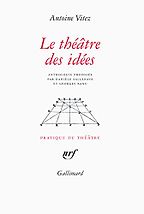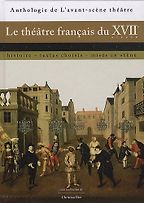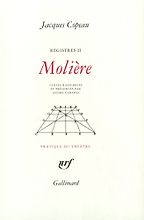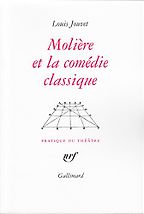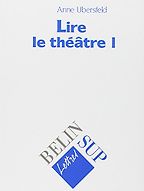Let’s begin with our theme: French theater. How would you characterize it? Are there key differences relative to other theatrical traditions?
Yes. We have, first of all, an extensive repertoire. There are many classical authors, many in the 17th and 18th centuries. There has been a great deal of production in French theater. So already, relative to other traditions, we have this prestige, this long history, with many authors. Which means that there is a deep French and Francophone theater repertoire.
Today, contemporary theater is also important. There are many French authors who write today – it’s a continuing tradition. And I would say that relative to other traditions ours is strong because we have a great history behind us. For example, in the American tradition, one thinks of the great American classics by Eugene O’Neill, one thinks of Tennessee Williams, Arthur Miller. The American tradition begins later, and is therefore less extensive. Whereas we have this French tradition that goes very far back.
I would add that this tradition is above all literary, because the majority of the works are preoccupied with questions of language. Language and wording are very important in French theater – much more so than storytelling and realism, which are more important in the British or American traditions. In French theater, it’s the text and the way it’s written that informs the key ideas – it’s very much part of the French tradition. In other words, it’s the author’s style, the language, and the phrasing that are very important. There is a great oral tradition in French theater, but I would also say, quite simply, that it’s literature. There are unique works of literature in the French repertoire.
Your choices seem to offer diverse ways to approach French theater: how to read it, how to interpret it, how to represent it. What guided your choices?
It was first of all a very personal list; personal choices of books that I love, and that I also peruse frequently. They are important references.
These are also works where one can read even just a few pages – one doesn’t need to read everything. That’s true of Antoine Vitez’s book, which is in fact a series of small articles. So you can choose to read certain passages in Le théâtre des idées, which is a vast collection. In the Anthologie de l’avant-scène théâtre, a fantastic book, one can concentrate on one author, one period, or even simply the introduction to a chapter, to a historical period. So I would say that I based my choices first of all on what I personally like, books that I like having near me.
I’m also looking for thinkers. Academics, but also people who are in the trade, are directors, producers who have thought and written about theater. For example, Louis Jouvet, Antoine Vitez, and Jacques Copeau are men of theater who write about their experience, their directing, their ideas. These are elegant works because they represent the living tradition of French theater. Jouvet and Vitez are the two of the most important directors of the 20th century.
What were Vitez’s main inspirations?
It’s difficult to summarize, but Vitez was mainly interested in the reverberation between texts. For him, the meaning of a text is plural – there is no single meaning, it could mean many things. Especially in a script; there are a thousand other illuminations, other echoes, other resonances. He’s interested in doing a theater of exploration, a theater of imagination, he evidently seeks to open up all the possible meanings. He was one of the greatest directors of the 20th century. He was open to all literatures, looking to bring out all the possible meanings.
Are there passages in Le théâtre des idées that you would specifically recommend?
What’s great about Le théâtre des idées is that there are reflections on teaching theater – he founded his own theater school and taught for a long time at the Conservatoire de Paris – there are reflections on training, etcetera. I find all the passages on coaching very enjoyable, everything about how plays are put together. These are short think pieces, short articles in the book.
Otherwise, I also love the whole part in Le théâtre des idées where we find the programs of plays that Antoine Vitez directed. It’s brilliant again and again, because it’s a vast repertoire. He’s directed many authors, and of course authors from around the world. He didn’t stop at French theater. But when one reads Le théâtre des idées one finds insights into Molière’s Le misanthrope, Racine’s plays, etcetera. And that makes for a great read. So I would recommend the plays and theater programs, the section about training, and the reflections around the art of theater.
And in the Anthologie de L’avant-scène théâtre, which periods interest you the most?
In the Anthologie, in fact, everything. It’s organized by century. So there’s the well-known 17th century with Molière, Racine, the comédie-ballets. The whole period. 18th century theater is also fascinating with Marivaux, Beaumarchais – very revolutionary theater – a lot of great stuff. And then I love the 19th and 20th centuries – everything is fascinating.
But what is truly admirable about these volumes is that they make us discover many other smaller authors who have been forgotten today. There aren’t just the principal authors, there’s also all the other movements that were important at the time. There was revolutionary theater – Voltaire, for example, wanted to be a playwright above all. He’s known today more as an essayist or novelist, but he initially wanted to be a playwright. He dedicated himself to this period of revolutionary theater that’s less known today, that’s less played, but that the Anthologie will present to you, without neglecting better known plays.
I’d also say with regards to the Anthologie that I really appreciate the 19th century; Victor Hugo and the symbolist period. I really love the whole Anthologie, and I use it a lot for my courses.
Does one get the notion of an evolution between these different epochs in the Anthologie?
Absolutely. The whole of the Anthologie tells a story; the great story of French theater.
Moving on to Molière by Jacques Copeau, it’s said that Copeau was an exemplary Molière. Why is that?
There was a period when Molière was played during the creation of the Comédie-Française – that’s the end of the 17th century. Then, in the 18th and 19th centuries notably, Molière is no longer in style. He’s played rather poorly. There’s a famous quote by Alfred de Musset where he complains about how bored he was watching le Misanthrope at the Comédie-Française. We continued to play Molière, but it was done less well. His repertoire was falling into disuse.
What Copeau did is reflect on the sound of theater, on the proper play style that needs to be developed. He uses Molière to come back to the origins of theater. What’s revolutionary with Copeau is that he stages Molière in a very pure, simple manner, on a naked stage – on what’s called the tréteaux, that is the stage and just the actors – Molière’s pure text. He’s revolutionary because he adapts Molière to contemporary tastes, while removing the high-flown part of tradition – the costumes, and so on. He asks himself what is the source, the beginning of French theater. He focuses a great deal on it.
In Molière he talks a lot about that, and he situates Molière’s heritage in this beginning of the 20th century. It’s fascinating to watch Copeau, this mythical figure who is more of a director, and who wants to develop the art of theater. He focuses a lot on the actor’s play, revolutionizing all that. He’s a man of the theater who tries to modernize the style of play, to make it more essential; he inscribes himself fully in the tradition of modern theater.
Is there a Molière play about which he was particularly insightful?
Yes: the Fourberies de Scapin. One should know that Copeau ran a theater company and had a garden on rue du Vieux-Colombier – the Théâtre du Vieux-Colombier of the Comédie-Française. There are three halls of the Comédie-Française. It’s a beautiful historical place in Paris because it was Jacques Copeau’s theater. In this theater, he notably staged Scapin. There’s a famous image of an actor playing Scapin with a very simple, white costume, and just the naked scene: Scapin, another actor, and one or two accessories. It’s very simple.
What’s different about Jouvet’s perspective on Molière relative to Copeau’s?
They actually both seek the primary spirit of Molière; a certain purity or authenticity of play. Copeau focuses on rediscovering the essence of this tréteaux theater. Jouvet tries to invent a new way of playing Molière by bringing out the truth of the meaning to be heard and felt. But they’re similar, overall.
How has Jouvet inspired your teaching?
He insists on the primality of the text, proper breathing, and conveying the correct meaning.
Lastly we have Anne Ubersfeld’s Lire le théâtre.
I chose Anne Ubersfeld because it’s an important book. With respect to analyzing theater, it’s a fundamental work. I could also have added another book by someone a little bit like Anne Ubserfeld, who is also an academic writing about theater, Robert Abirached. He wrote a very important book, La crise du personnage dans le théâtre moderne. It’s a bit of a panorama on modern theater. He explains how the notion of character is in crisis since the ‘30s and ‘40s.
How does this book address the distinction between text and representation?
This book helps to analyze plays, and puts forth how to read not only the text, but also the representation and above all the internal and dramatic organization of the play.
As a teacher, what important lessons have you gotten from this work?
That the way a play is staged can and should be analyzed separately from the text. They’re independent objects and they reinforce the text’s meaning.
Interview by Eric Bolton
January 24, 2017. Updated: November 10, 2018
Five Books aims to keep its book recommendations and interviews up to date. If you are the interviewee and would like to update your choice of books (or even just what you say about them) please email us at [email protected]
Five Books interviews are expensive to produce. If you've enjoyed this interview, please support us by donating a small amount.
